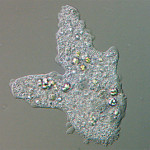An ongoing dialogue on HIV/AIDS, infectious diseases,
December 20th, 2009
Infections from Transplant Donors: Rare but Inevitable
 Two kidney transplant patients are critically ill due to Balamuthia mandrillaris encephalitis they acquired from the organ donor:
Two kidney transplant patients are critically ill due to Balamuthia mandrillaris encephalitis they acquired from the organ donor:
The same infection probably killed the organ donor, but it was not diagnosed; his doctors thought he had an autoimmune disease. Two other patients also received heart and liver transplants from the donor, but neither has become ill.
Infections due to free-living amoeba are extremely rare; those acquired from transplant even more so.
Hence the lesson from these transplant-related cases is not that there’s a new threat to the health of transplant recipients.
But it’s a reminder that the infection risk will never be zero. We cannot test donors for every possible disease, and the shortage of available organs means that some donor-derived infections will inevitably continue.
(These LCMV cases caused quite the stir around here a few years ago.)
Organ transplantation remains one of the great miracles of medicine. With the caveat that I don’t know further details about this donor’s case, it seems that a (small) risk of donor-derived infection is the price of doing business.
(Edit: And now the WSJ has weighed in here. Focus is on those harmed by the infection, understandably, and the need to make the process safer — but the fact remains that transplant will never be 100% safe.)

